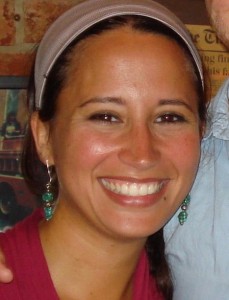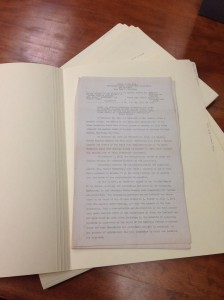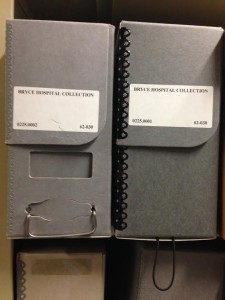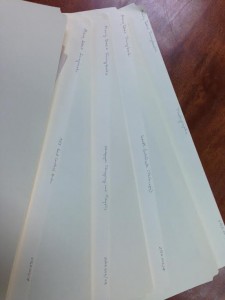By: Brooke Champagne, English instructor at The University of Alabama
Editor’s Note: This post is the first of a six-part series highlighting innovative special collections pedagogy. Brooke Champagne, an instructor of English at The University of Alabama, taught two sections of ENG 103 honors composition this fall. This post is an interview with Champagne discussing the project she assigned her class using W.S. Hoole Library and Williams Collection materials. Following posts will include the assignment, two examples of projects which resulted from the assignment, and interviews with both featured students.
***
Thank you for participating in our Special Collections Pedagogy Series. To begin, why did you decide to use archival materials in your honors composition course this fall?
I was inspired by Erik Larson’s luminous nonfiction text about the 1893 Chicago World’s Fair, Devil in the White City. I actually read the book several years ago, but I let a writer friend of mine borrow it this summer and we talked about the book afterward. She was amazed, as I was upon first reading, at Larson’s quality and enormous breadth of research, almost all of which came from primary sources. She also reminded me about the “Notes and Sources” section in the book which admits to the reader that two scenes in the book were essentially made up (the author had to enter the mind of one of H. H. Holmes’ victims who was imminently murdered, and of course, there is no documentation of those thoughts). This admission, which doesn’t detract from the incredible research and authenticity of the text, got me thinking: what do archives tell us and what do they fail to tell us? What stories are in the archives of our own university’s special collections? Larson is telling an epic story here, but what about the forgotten figures of our local history? What stories are waiting to be told, and how, once the research is found, should those stories be told? I knew it would be a massive, semester-long project for students, but I was confident that my advanced composition courses could take on the challenges.
Did you previously use archival material in your classes before this semester?
No, never. I’d never been to the archives myself, but I’m happy to say that’s changed because of this project and the wonderful support I’ve received from special collections here at UA.
Tell us about the project you designed.
With the help of Amy Chen, we offered students a list of about eighteen or so historical figures with material in the archives. The goal of the 2500-word research project was to have students immerse themselves in the primary documents of their chosen subject, and to find the story or stories within. After spending several sessions in special collections, students would then supplement their primary research with secondary research, trying to learn as much as possible about the time period in question, informing their representation of their chosen eras. Ultimately the students’ projects should read more like an engaging narrative rather than a research paper, though obviously they were both.
What did you feel was the most difficult aspect of adapting your syllabus to fit in a project using the archive?
Because this was the first time I was teaching this type of research project, I had no previous student examples to model for students what this project could look like. We used Erik Larson as a model, but his books take years to research and write, so clearly I’m not holding students to those kind of standards. Another minor difficulty is that the rhetoric textbook we used for the class doesn’t precisely support the writing of this exact kind of paper. However, the rhetoric included an “argumentative synthesis” chapter that deals with composing an argument based on many different source texts, so that structure was close enough to what I was asking students to do for the assignment.
What did you feel was the most beneficial aspect of including an archival project in your syllabus?
Generally I’ll say that students learned a lot about the history of their chosen subject and its community, much more than just reading a historical text about it. Students were asked to read a large grouping of texts and then fashion a story out of it. This forced them to become intimate with the material, and in a tactile way that isn’t possible through internet research. So ultimately I think the most beneficial lesson for students was coming to understand that academic research isn’t one thing, that it can be accomplished in a myriad of ways. Plus it introduced them to the concept of primary documents, which many believed were relegated to museums and professional researchers as depicted in those Nicholas Cage National Treasure movies — they didn’t even know that had this kind of access to history.
How did your students respond to your assignment?
They responded with fear, trepidation, and excitement all at once. The idea of going into the archives was one they’d never considered before; many weren’t even sure what “archives” meant. On the day I distributed the assignment, one student slapped his palm to his head and asked, “Is this even possible?” Once they got in to the archives, though, they were pretty much hooked. Students were calling their parents to tell them about the documents they’d sifted through that day. They began sharing stories in class about the gossip and heartbreak they’d read in their century-old letters. Now, don’t get me wrong: they were still anxious about having to fashion a story out of all this material. But they generally fell in love with the material and the process of discovery, and I loved that.
What do you think was the most challenging aspect of this assignment for your students?
I think Occam’s razor applies best here: students are plugged into technology wherever they go, so they are used to doing research on their own time and terms. Every one of them stated early on in the semester that their primary research method, past and present, is to Google. So for them to now deal with restrictive library hours, and to have to actually get dressed and walk across campus to do research—I think this was the greatest adjustment for students to have to make.
What do you think was the most enjoyable aspect of this assignment for your students?
Once the fear of getting in trouble at the archives (mishandling the documents, getting documents dirty or out of order) I think they mostly enjoyed actually getting in there and reading, handling, touching historical documents. One student told me about reading a letter addressed to Buford Boone from Martin Luther King, and how just touching the document made her cry. Her first fear was that her tears would destroy the letter, so she kept drying her eyes with her sweatshirt sleeve. There was a lot of spirituality in dealing with these documents, and I think it was the element students most appreciated.
On a whole, how do you think the project went?
Spectacularly. In ten years of teaching, I’ve never seen students so dedicated to the work they’re doing for one of my classes. When I’ve taught research in the past, the assignment usually asked for students to construct an argument (whether classical, Rogerian, or Toulmin) surrounding some focused subject that was covered in class during the semester. My issue with this type of assignment has always been that most students’ conception of argumentation is digging their heels in and arguing for a pre-determined position. As much as I try to inculcate the idea of an evolving thesis, letting research and discovery refocus their initial goals, recognizing the multiplicities and nuances of any issue, students often use their shorthand “this is how I feel about the issue and I’m going to set out to prove it” in order to just get the assignment completed.
But with this archival research, students had no biases or plans for where their project was going; they were essentially starting from zero. This was discomfiting, I assured them, but also what the genuine research and writing process should look like. When I’ve tried to teach this in the past, I’ve often gotten the “yeah, yeah,” because students couldn’t be shaken from the thesis they’d started with. But with this project, they totally got it—they had no choice. All of this to say, I think students gained a great deal of knowledge through this project, and so did I. Their projects were beautiful, on the whole so well thought out and researched. And, oh yes, very fun to read. Any teacher of writing will understand the hallelujah inherent in that last statement.
Since you taught two sections of honors composition, did the sections respond similarly or differently to the assignment?
That’s such a great question, because often two different classes will approach and react to any assignment differently. My great fortune was in having to extremely dedicated, intellectually curious sections of advanced composition. A handful of students in each class complained good-naturedly about the project, and then of course turned in brilliant focuses for their papers. So while the classes were different in nature, they took to the assignment pretty similarly.
If you did this project again in the future, what would you do the same? Would you structure anything differently?
The assignment itself might not change very much. What I would skew on my syllabus, however, is the project due date. Currently, it’s their final project of the semester, due during finals week. In a subsequent semester I would distribute the assignment on the very first day of class and have their first couple of papers (summary, response, etc.) directly deal with their archival work, thus more clearly connecting one essay assignment to the next. An early archival project due date would also allow for me to assign a reflection essay that would ask students to narrate their research process, to describe more informally what they learned through their project and how it affected them, and possibly project how their findings contributes to the “real world” outside of academia.
My greatest goal is to make my students’ work “real” for them. For those who struggle with writing and plan to never need it again, I want to reinforce how anytime one wants or needs to truly engage with the world, whether for professional or personal reasons, they will probably at some point need to write it out. So I would like to add some kind of post-research shorter paper assignment that has them explain how this work has personally or professionally affected them. I ran this idea by my students this semester and they seemed to like it. I’m in the process of writing this assignment for next semester’s section of advance composition, so we’ll see.




